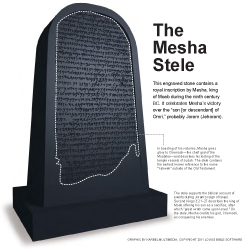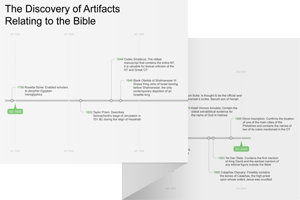3:1–27 The narrative briefly begun in 1:1 continues here. While the biblical account of Moab’s rebellion against Israel focuses on the role of Elisha the prophet, another account appears on the Mesha Stele (also known as the Moabite Stone). This stone, an inscribed pillar or obelisk, dates to about 830 bc and commemorates the achievements of King Mesha of Moab—especially his defeat of Israel. The inscription mentions the Israelite kings Omri and Ahab by name, making it one of the earliest references to Israel outside the Bible. It also names Yahweh, stating that Mesha “took from there the vessels of Yahweh and dragged them before Chemosh” (lines 17–18). (Chemosh is a Moabite god.) |
3:1 Joram the son of Ahab The final king in the Omride dynasty (see note on 1 Kgs 16:21–28); he succeeded his brother, King Ahaziah of Israel, since Ahaziah did not have a son (2 Kgs 1:17). He is not the same person as the king of Judah, who in the Hebrew text shares the same name, yehoram (Jehoram; compare note on 1:17).
Omride Dynasty | 885–841 bc |
Omri | 885–874 bc |
Ahab | 874–853 bc |
Ahaziah | 853–852 bc |
Joram/Jehoram | 852–841 bc |
in Samaria Capital city of the northern kingdom of Israel.
Jehoshaphat king of Judah An ally of King Ahab of Israel (1 Kgs 22); Jehoshaphat attempted to revive the sea trade established under Solomon (1 Kgs 22:48–49).
3:2 yet not as his father or his mother Refers to King Ahab and Jezebel, who instituted the worship of the Canaanite storm god Baal and Canaanite fertility goddess Asherah and persecuted the prophets of Yahweh (see 1 Kgs 16:31–33; 18:4).
3:3 the sins of Jeroboam Refers to the installation of the golden calves and the establishment of high places and their accompanying temples, where people worshiped other gods along with Yahweh (1 Kgs 11:26–33; 13:33–34). Jeroboam reigned over the northern kingdom of Israel, after the nation split into Israel and Judah (ca. 930–909 bc).
3:4 Mesha king of Moab Mesha’s name and ancestry appear in the opening line of the Mesha Stele, an inscription that describes Mesha’s interactions with King Ahab of Israel. See note on 2 Kings 3:1–27.
The Moabites were descendants of Moab |
a sheep breeder The same profession as the prophet Amos (see Amos 1:1 and note).
3:5 Moab rebelled against the king of Israel See 2 Kings 1:1 and note.
3:6 from Samaria See note on v. 1
3:7 my horses are like your horses Jehoshaphat makes this same vow to Jehoram’s father, Ahab, concerning the battle against Syria (1 Kgs 22:4).
3:8 By way of the wilderness of Edom The invasion route (through the wilderness of Edom) is critical to the storyline. Due to the circuitous nature of their chosen approach to Moab, the invading armies soon found themselves in desert terrain without water (2 Kings 3:9). Edom, located southeast of Israel and Judah, was the territory settled by the descendants of the Esau (Gen 25:25; 36:1, 8).
3:9 the king of Edom This verse probably is referring to Edom’s governor or deputy, because 1 Kgs 22:47 says there was no king in Edom during the reign of Jehoshaphat.
3:11 no prophet of Yahweh here Jehoshaphat made a similar request when aligning with Ahab against the Syrians because he was not satisfied with Ahab’s prophets of Baal and Asherah (1 Kgs 22:5–8).
we might inquire of Yahweh Compare 1 Kgs 22:5.
poured water on the hands of Elijah An image of servitude.
3:13 the prophets of your father Refers to the prophets of Ahab and Jezebel, who served the deities Baal and Asherah (see 1 Kgs 18:19).
3:14 As Yahweh of hosts lives This kind of phrase signals the start of an oath. This particular oath refers to Yahweh as the leader of hosts or armies (1 Sam 17:45).
 The Name Theology of the Old Testament
The Name Theology of the Old Testament
before whom I stand This expression often appears in both kingly court scenes (1 Kgs 1:2) and prophetic contexts (1 Kgs 17:1; 18:15; 2 Kgs 5:16).
3:15 the hand of Yahweh came upon him In 1 Sam 10:5, the band of prophets that meets Saul at Gibeath-elohim (“the hill of God”) also uses music to elicit prophetic oracles.
3:19 you shall fell every good tree The Mosaic law prohibits the felling of fruit-producing trees during a siege. Armies may, however, cut down trees that are not good for food to create siege works against a city (Deut 20:19–20).
3:20 the time of the morning offering The Law required the Israelites to offer morning and evening sacrifices every day (see Exod 29:38–42 and note).
3:23 This is blood Flowing blood is a common motif in ancient Near Eastern accounts of military victory.
3:25 Kir Hareseth Perhaps refers to Kir-Moab, a major city in the south of Moab with steep approaches on either side (Isa 15:1; 16:7; Jer 48:31, 36).
3:26 to the king of Edom Mesha, king of Moab, apparently considers the ruler of Edom the weakest of his three opponents (1 Kgs 22:47).
3:27 his firstborn son who was to become king In the ancient Near East, the eldest son typically took the throne after his father’s death.
offered him as a burnt offering Leviticus 20:1–5 prohibits sacrificing children to Molech. Jephthah the judge may have offered his child as a sacrifice to fulfill a vow (Judg 11:30–31; Lev 27:29).
wrath The Hebrew term used here describes anger toward wrongdoers (Num 18:5; Deut 29:27; Josh 9:20; 22:20), but it is uncertain whose wrath the text refers to here. It may be the perceived anger of Chemosh, Moab’s patron god, leading to the Israelites’ defeat.

|
About Faithlife Study BibleFaithlife Study Bible (FSB) is your guide to the ancient world of the Old and New Testaments, with study notes and articles that draw from a wide range of academic research. FSB helps you learn how to think about interpretation methods and issues so that you can gain a deeper understanding of the text. |
| Copyright |
Copyright 2012 Logos Bible Software. |
| Support Info | fsb |
 Loading…
Loading…




 Moabites
Moabites  (son of Lot and his older daughter;
(son of Lot and his older daughter;